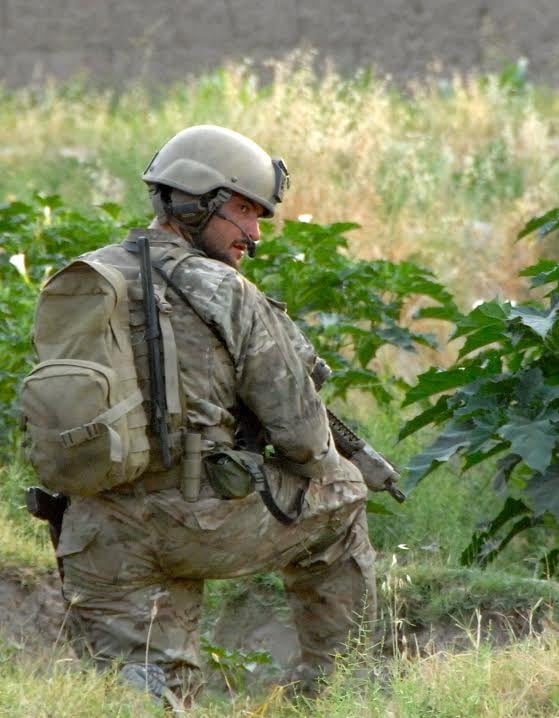The Green Beret getting kicked out of the Army for beating an alleged child rapist in Afghanistan has been given a 60-day reprieve, the Army said late Tuesday.
Army Secretary John McHugh "agreed to postpone Sgt. 1st Class Charles Martland's discharge from the Army for 60 days to allow him to file an appeal with the Army Board for the Correction of Military Records," the Army said in a statement.
The decision was made after Rep. Mac Thornberry, R-Texas, chairman of the House Armed Services Committee, spoke with and wrote a letter to McHugh. The decision was "out of respect for Chairman Thornberry's continued strong support for our military and his personal appeal," according to the Army statement.
Martland and his then-detachment commander have admitted to attacking an Afghan Llocal Ppolice commander in Kunduz province in 2011. Martland, a Bronze Star recipient, has served since then and wants to remain in the Army. He was flagged for involuntary separation through the Army's qualitative management program because of his role in the assault. Martland had been was scheduled to leave service no later than Nov. 1 after 11 years in the Army.
Martland has gained many supporters, including Rep. Duncan Hunter, R-Calif.ornia, and the VFW. Many consider Martland a hero for his actions, especially in light of reports U.S. soldiers were told to overlook the sexual abuse of young boys, especially at the hands of the security forces, in Afghanistan.
Thornberry spoke by phone Tuesday with McHugh, according to a press release on the House Armed Services Committee website. They discussed Martland's case, and the conversation followed "several weeks of committee review of SFC Martland's service record and the Army investigation into the incident," HASC press release said.
During their conversation, Thornberry expressed his view that Martland's discharge should be delayed until he can prepare an appeal with adequate military counsel, the release said.
After the men spoke, Thornberry sent a letter to McHugh elaborating on the committee's inquiry, his recommendation to the Army, and his larger concerns regarding policies in place for U.S. troops to report human rights abuses.
"Congress cannot substitute our judgment for that of the military chain of command," Thornberry wrote. "We are, however, responsible for ensuring that the process in place is fair and adequate to the demands of an Army at war."
Thornberry went on to write that he "noted potential procedural errors in due process" in Martland's case.
He also noted that the Army allowed Martland to stay in uniform for four years after the 2011 incident, but selected him for involuntary separation when it was forced to shrink the force.
"This is the unfortunate by-product of indiscriminate cuts to our military," Thornberry wrote.
The QMP process is "vitally important to ensure that the Army retains only the best qualified soldiers," the Army said in its statement. "While the material in Sgt. Martland's file required that he be considered by the QMP board, it is our desire to ensure every soldier receives fairness and due process, and we continue to act accordingly."
In an interview Monday with Army Times, McHugh said Martland's case is "an ongoing investigation."
"Sgt. Martland has appeal rights still available to him," McHugh said, adding that the QMP board reviewed about 1,500 noncommissioned officers' files.
That board, made up of a brigadier general and a handful of Special Forces sergeants major, "selected Sgt. Martland for separation based on those files, which were, in turn, based on the information that the commanders in Afghanistan entered into those files," McHugh said.
In all, nearly two-thirds of the 1,500 NCOs reviewed by the QMP board were recommended for separation, McHugh said.
"'We rely upon this process, routinely, to go through and determine which soldiers have met the very high standards of service in the United States Army," he said. "It certainly was not an action directed specifically at Sgt. Martland."
McHugh added that despite "talk that this case has been brought to me, and I have had a hand in it, I have not. This is a routine administrative process that does not, in any way, involve my office."
The Army must respect the process in cases like this, McHugh said.
"We respect the rights of the individual soldier in these kinds of cases," he said. "If we are going to make a mistake here, we are going to make it in favor of the rights of the soldier."
Michelle Tan is the editor of Army Times and Air Force Times. She has covered the military for Military Times since 2005, and has embedded with U.S. troops in Iraq, Afghanistan, Kuwait, Haiti, Gabon and the Horn of Africa.




